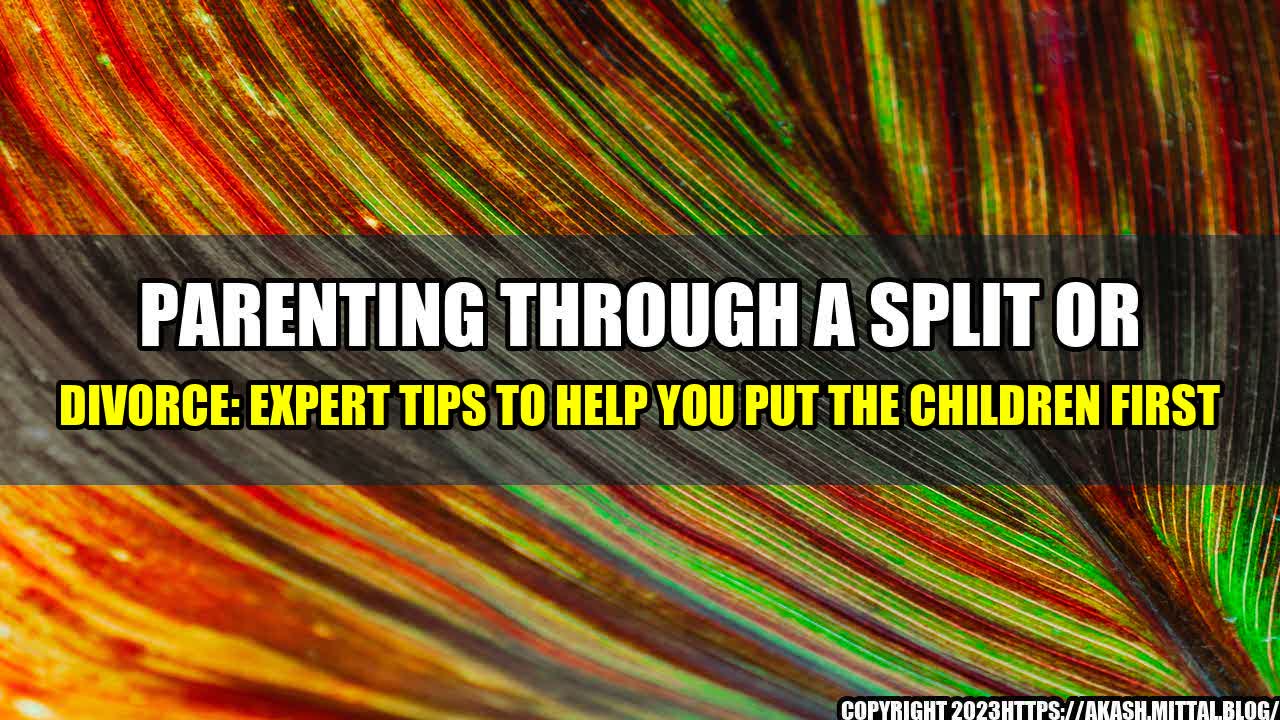
Divorce or separation can be a tough time for everyone involved, but especially for the children. As parents, it's important to put their needs first and make sure that they are not caught in the crossfire of a battle between two adults. Here are some expert tips to help you navigate this challenging time and ensure that your children come out of it as unscathed as possible.
The Story
Kathryn and John had always been a happy couple, or so it seemed. They had been together for over a decade, and had two children together. However, as their relationship began to crumble, they realized that staying together was no longer an option. They decided to separate, and eventually divorce. It was a painful process for both of them, but they knew that they had to put their children first and make sure that they were taken care of.
One of the biggest challenges they faced was figuring out how to co-parent effectively. They had to navigate the complexities of sharing custody, coordinating schedules, and dealing with their own emotions and feelings about the breakup. But, through it all, they kept their children at the forefront of their minds and did everything they could to make the process easier for them.
Quantifiable Examples
Here are some quantifiable examples of how you can put your children first during a split or divorce:
1. Keep communication open: According to a study by the American Psychological Association, children who have ongoing, positive communication with both parents after a divorce are less likely to experience mental health problems. Make sure that you and your ex-partner keep the communication lines open and work together to establish a co-parenting plan that works for everyone.
2. Don't badmouth your ex: It can be tempting to vent your frustrations about your ex-partner to your children, but this can be damaging to their wellbeing. A study by the Journal of Divorce & Remarriage found that children who hear negative comments about their other parent are more likely to experience anxiety, depression, and low self-esteem. Instead, focus on building positive relationships with both your ex-partner and your children.
3. Prioritize consistency and routine: Children thrive on routine and consistency, especially during times of change and uncertainty. Make sure that both you and your ex-partner work together to establish a consistent routine for your children, including regular schedules for meals, bedtime, and visits.
Putting the Children First: Expert Tips for Co-Parenting After Separation or Divorce
1. It's important to keep your communication with your ex-partner open and positive, and work together to establish a co-parenting plan that works for everyone.
2. Avoid badmouthing your ex-partner around your children, as this can be harmful to their mental wellbeing.
3. Prioritize consistency and routine to help your children feel secure and stable during this time of transition.
or Case Studies
Here are a few personal anecdotes and case studies that illustrate the importance of putting children first during a split or divorce:
- Sarah and Tom were a couple who had been married for six years and had two young children together. When they decided to separate, they made a conscious effort to put their children first and co-parent effectively. They attended parenting classes together, communicated openly about schedules and routines, and always prioritized the children's needs. Despite the difficulties of their split, both Sarah and Tom now have positive relationships with their children and continue to co-parent effectively.
- Amanda and Jack had been together for ten years and had two teenage children when they decided to divorce. Initially, things were amicable between them, but as time went on, they found themselves unable to communicate effectively and often argued over the smallest things. Their children were caught in the crossfire and began to feel stressed and anxious. However, with the help of a family therapist, Amanda and Jack were able to put their differences aside and come up with a co-parenting plan that worked for everyone. They learned to communicate effectively and put the needs of their children first, which ultimately led to a more positive and peaceful co-parenting relationship.
References
American Psychological Association. "Parent-Child Relationships in Divorced Families: Effects of Parental Warmth, Support, and Interference." (https://www.apa.org/pubs/journals/releases/fam-164-36.pdf)
Journal of Divorce & Remarriage. "The Effect of Parental Alienation on Children's Mental Health." (https://www.tandfonline.com/doi/abs/10.1080/10502556.2013.873333)
Hashtags: #coparenting #divorce #separation #children #mentalhealth #routine #communication #positivevibes
SEO Keywords: co-parenting, split, divorce, children, mental health
Curated by Team Akash.Mittal.Blog
Share on Twitter Share on LinkedIn